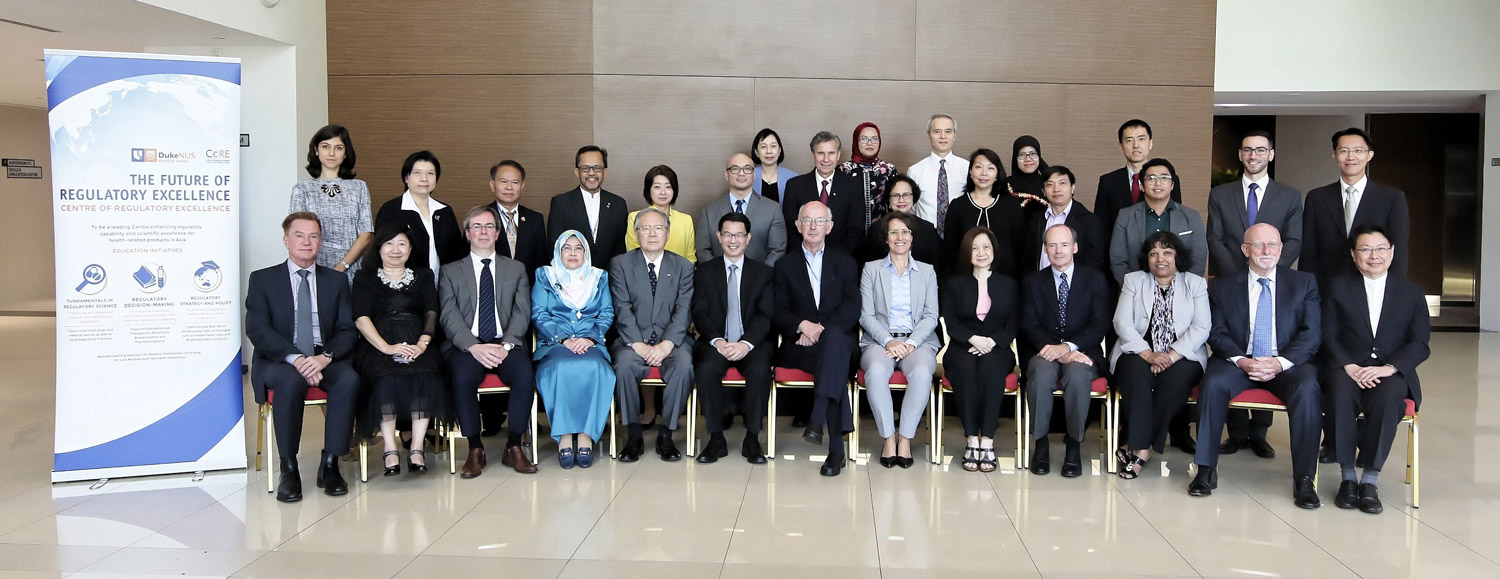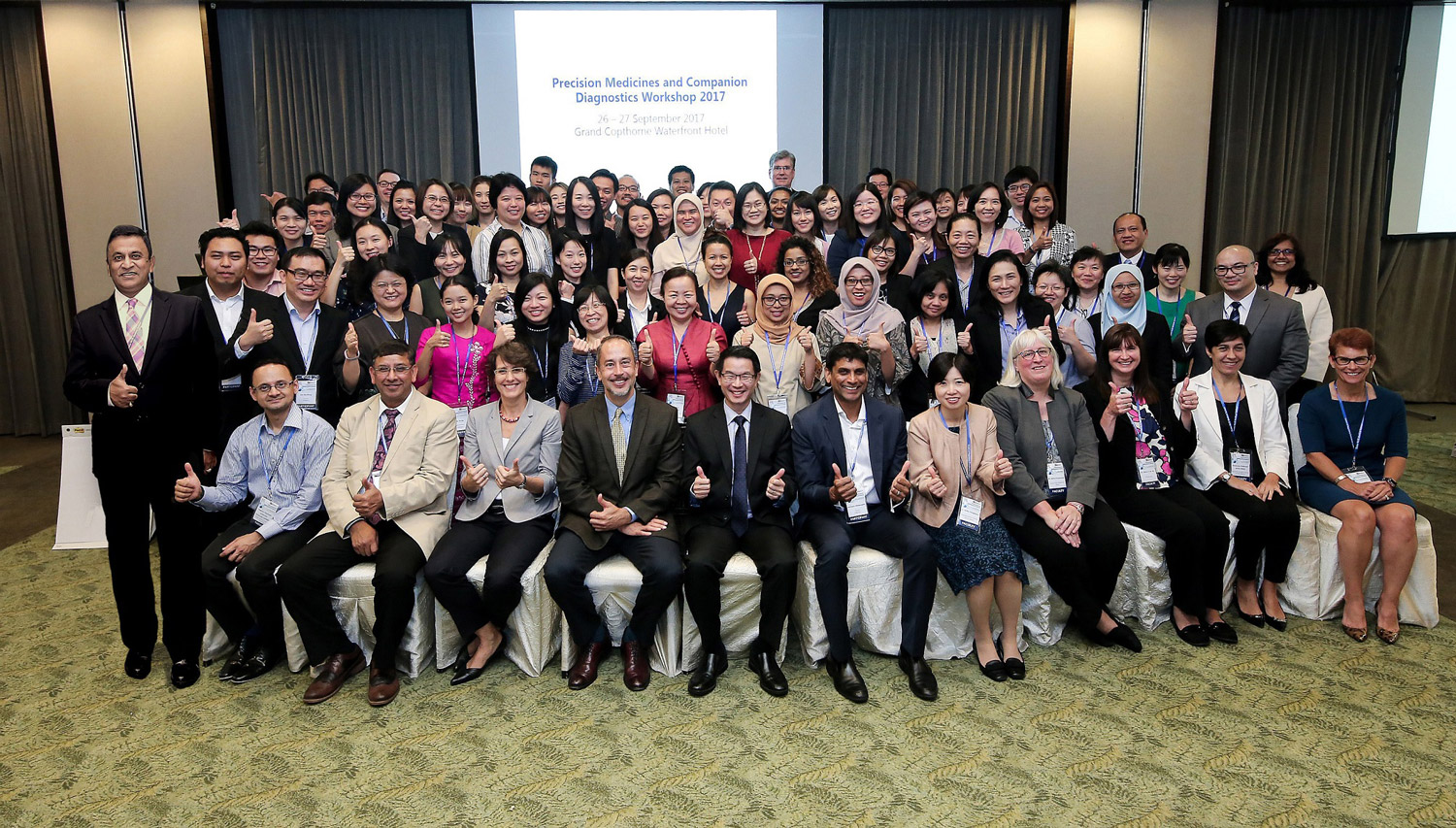Regional Reports
Conversations in ASEAN: Facilitating Access to Precision Medicine, and Partnering to Strengthen Regulatory Systems
Silke Vogel
DIA Global Forum ASEAN Regional Editor
Hozanna Ngoh
Centre of Regulatory Excellence
Duke-NUS Medical School, Singapore

2017 ASEAN Regulators’ Roundtable
Strengthening regulatory systems can adopt multiple approaches to address gaps in regulatory capability and capacity. Building regulatory capability is a vital early focus in systems-strengthening initiatives, and has been identified as an area of need in ASEAN for regulatory professionals in regulatory authorities and the industry.
This update highlights key insights gained from respective dialogues at the Precision Medicines and Companion Diagnostics Workshop (26-27 September) and the 2017 ASEAN Regulators’ Roundtable (9 October), both organized by the Duke-NUS Centre of Regulatory Excellence (CoRE). Providing the platform for open dialogue among ASEAN regulators, industry, and academia, these programs focused on emerging topics in the healthcare and regulatory space (such as precision medicine and real-world evidence) and fostered collaboration for regional efforts to strengthen regulatory systems.
Facilitating Access: Precision Medicine & Companion Diagnostics
Precision medicine (PM) is rapidly transforming healthcare by promising precise selection of the right patient, for the right treatment, at the right dosage, and at the right time, based on the patient’s unique genetic, environmental, and lifestyle characteristics. Integral to PM are companion diagnostics (CDx), devices designed and developed to select the right patient candidates for the precision drug. Inevitably, this codependent relationship between drug and device flags the need for tight coordination of the development and regulatory review of both products to ensure timely access to PM/CDx.
Through facilitated dialogue sessions which elicited “on the ground” participant perspectives, discussions on the barriers and solutions to enabling timely access to PM/CDx in Asia-Pacific can be summarized into the following six domains.
Training and Education: Lack of regulatory expertise in the advanced PM field could be addressed by establishing centers of excellence that gather expertise, provide training, and promote knowledge sharing. Lack of trained genetic counsellors was another identified need.
Infrastructure: Joint laboratory facilities for shared usage among multiple healthcare institutions could help with the region’s limited setup of accredited genomic sequencing and testing sites.
Patient Information: The multitude of considerations in handling of patient information in PM include risk of genomic data misuse, data ownership and rights, reliable interpretation of genomic data, and ethical obligation to report interpreted results. Policymakers must strike a balance between protecting patient safety and meeting wider public health needs.
Affordability: High initial costs expected for novel PM/CDx products could be addressed through sharing resources (i.e., centralized laboratory facilities), developing policies that balance public health and economic growth, and involving health technology assessment bodies earlier in the regulatory process.
Regulatory: Drugs and devices are distinct health products with different developers and are evaluated by different regulatory departments (or agencies, in some jurisdictions) with different evaluation timelines. Streamlining regulatory processes for drugs and devices could be expedient, especially with early and continuous communication and coordination among industry and regulators.
Political Support: Participants observed variable levels of political support for PM initiatives across the region. International agreements could help to motivate commitment at national levels.
This dialogue proved to be effective for multiple stakeholders to share their experiences and pinpoint specific issues in facilitating patients’ access to PM/CDx in Asia-Pacific. These contributed useful insights to further discussions aimed at developing relevant action plans to drive access in the region.

Precision Medicines and Companion Diagnostics Workshop
Strengthening ASEAN Regulatory Systems
CoRE hosted its second ASEAN regulators roundtable, focused on strengthening ASEAN regulatory systems, in October. The closed-door roundtable convened senior representatives from the ASEAN national regulatory authorities (NRAs) as well as current and past regulatory leaders from other NRAs around the world. Also in attendance were technical partners and experts from scientific and health organizations such as the World Health Organization (WHO), United States Pharmacopeia, and the Asia-Pacific Leaders Malaria Alliance.
Narrowing its focus from the wider scope of regulatory harmonization and convergence discussed at the 2016 roundtable, this second meeting dived deeper into reviewing and refining ongoing approaches to enhancing regulatory capability and cooperation among the ASEAN NRAs. This was accompanied by a strong emphasis on avoiding duplication of effort, vital to helping NRAs take on proposed initiatives amidst resource constraints.
Roundtable discussions revolved around two ongoing initiatives: prioritizing identified activities for implementation under the Asia-Pacific Regional Regulatory Partnership (RRP) for Malaria Elimination; and facilitating progress of the ASEAN-WHO Joint Assessment project to Strengthen the Implementation of ASEAN Harmonized Requirements (SIAHR) for pharmaceutical drug registration. These discussions reflected the progressive move towards better coordination among regulatory and technical partners, with clear direction and measurable outcomes.
Partnering for Success
A common takeaway from these discussions was the need for strategic partnership and collaboration among stakeholders to drive successful translation of efforts into outcomes. This must be done in a way that meets the relevant needs of the region, makes best use of available resources, and effects changes that are long-lasting and sustainable.

